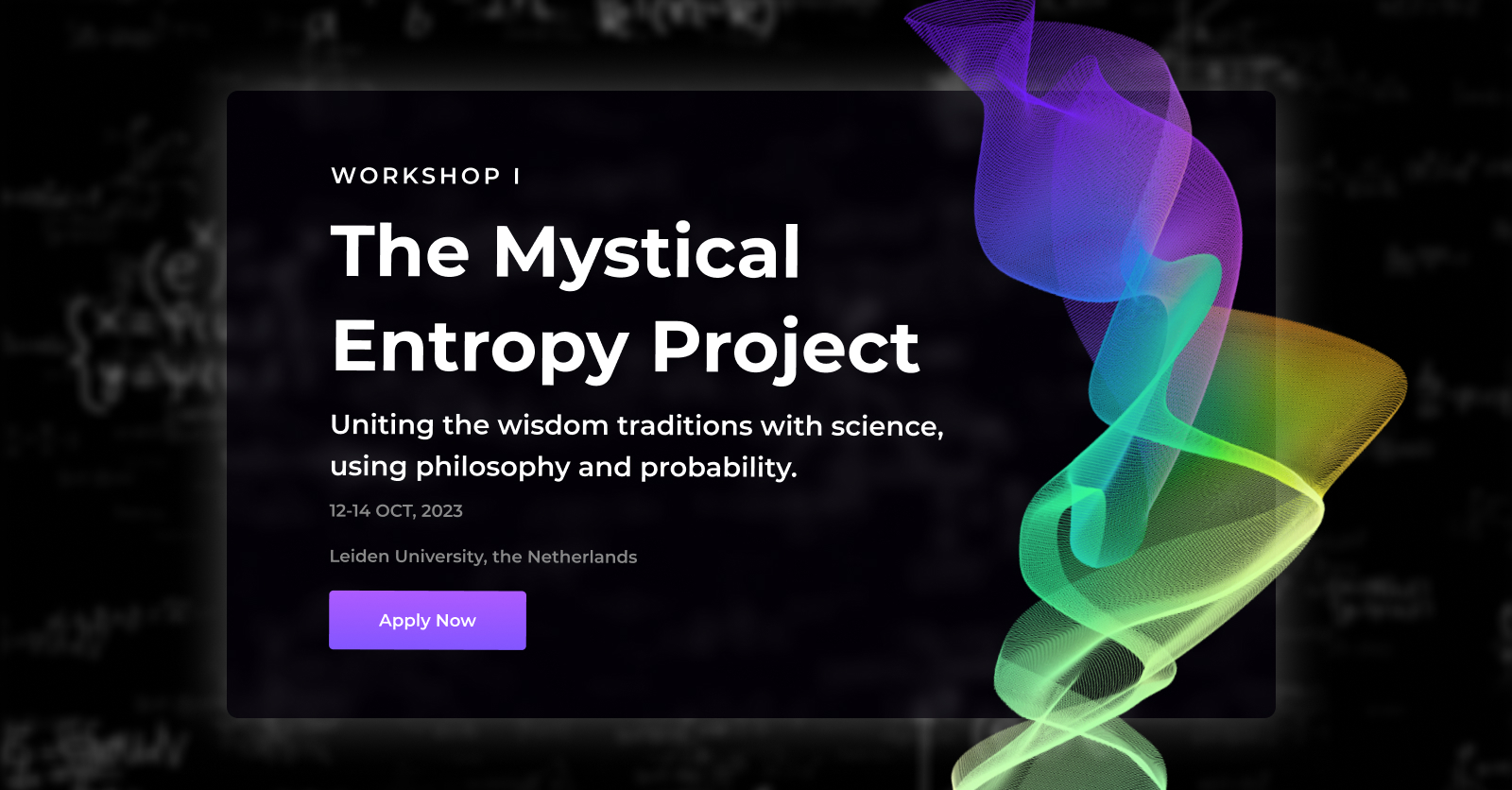Aug
2023
Mystical experiences are going mainstream. Once exclusive to the spiritually devout, these profound — and often life-changing — experiences are becoming increasingly available to the rest of human population.
Fueling this mainstreaming of the mystical is the resurgence of scientific research into psychedelics. Although exciting and showing signs of great promise, this research is still nascent and it would be unwise to treat its results as anything but tentative. However, one result that has emerged with a reasonable level of consistency is that the mystical-type experiences occasioned by psychedelics have an extraordinary capacity to imbue those who have them with transformative healing and transcendent levels of flourishing. Because of this potential connection with human well-being, scientists are now trying to understand more deeply the nature of these experiences — which have long been considered to reside outside the domain of science.
Fortunately, these experiences are not new for humanity, and they have been studied and systemised for thousands of years by a variety of mystical traditions — from Christian mysticism, Sufism, and the Kabbalah to Buddhism, Hinduism, and Daoism (and many more). It seems reasonable to expect, then, that the scientific research into mystical exepriences may have much to learn from these traditions. Indeed, the research so far has already been greatly informed — and made possible — by these traditions through the pioneering work of Walter Stace's 1960 classic, Mysticism and Philosophy. As scientists continue to collect new data on these experiences and their relationship to human well-being, it makes sense that contemporary philosophers might carry on the task of bridging the divide between the scientific and the mystical.
This is the overarching goal of the Templeton-funded Mystical Entropy project in the PRSM Lab at Leiden University (2023—2026). In this post, I'll outline the general approach of this project.
Why philosophy?
An important aspect of the project is that it doesn't have any specific agenda when it comes to how science and mysticsm may be harmonised. We are not setting out with the goal of finding scientfic evidence that justifies or substantiates the claims of the mystical traditions. Nor is the project an attempt to debunk these claims or to somehow reduce them to a staunchly materialist world-view. Although we are open to these possibilities, they are not assumed from the outset.
With that said, the project starts out from a scientific perspective since it is the scientific research into mystical experiences that has motivated the integration of science and mystcism. Our assumption is that by carefully broadening this perspective, we can find a common language for science and mysticism so that the former can receive the wisdom of the latter without comprising its empirical scruples. Importantly, this is not an unusual thing for science to do — indeed, it is the constant balancing act between skepticism and curiosity that makes science such a successful enterprise.
Our hypothesis is that at the end of this journey we will arrive at a new, hybrid perspective, that integrates the best of each world view. Whereas previous attempts have tended to lean too much towards one world view at the expense of the other, our goal is to strike a healthy middle ground. Moreover, we think that pursuing this project using the tools and methods of philosophy is the best way to make it a success. This is because philosophy is the lingua franca of science and mysticism. Modern science has its roots in natural philosophy and, although the mystical traditions often emphasise the importance of moving beyond philosophical theorising, they nonetheless make use of philosophical systems.
In this way, philosophy is an ideal field of inquiry for pursuing this project — it is neither scientific nor mystical and yet it is able to speak the language of both world views.
Why entropy?
To complement this general strategy of using philosophy to harmonise science and mysticism, we also have a more specific hypothesis for how this may be done: that the concept of entropy can provide a useful point of contact between these two world views.
We have two motivations for this hypothesis, one coming from science and one coming from mysticism.
From the scientific side of things, one of the leading ideas about what psychedelics to do the human brain is that they increase its entropy. This proposal is known as the entropic brain hypothesis. Although this research is nascent and results are still tentative, it appears that one of the key effects of psychedelics is to increase the general disorderliness of the functional connectivity between, and within, the brain's various networks. That may sound like a bad thing — after all, why would one want a more disorderly brain? However, the thought is that many psychological disorders can be characterised as the brain being too orderly — or, rather, too orderly in the wrong way. Examples include substance addiction, depressive rumination, and obsessive-compulsive thinking and behavior. By introducing some random flexibility in the functional connectivity of the brain's networks, psychedelics can help it shift out from these undesirable conditions into more desirable ones. Interestingly, there is also some emerging work that indicates that various meditative practices also have a similar effect on the brain.
One analogy that can help illustrate this idea is that of a deep-tissue massage. Just as the body's muscles can tighten and need relief, the brain's networks can also become overly rigid and thus benefit from a relaxation in their functional connectivity. Thus, we can think of psychedelics as "massaging" the brain's networks, making them more flexible and more responsive to their environment, the body, and each other. Importantly, this "massaging" likely only works up to a point — that is, too much entropy can be a bad thing. Indeed, other psychological disorders, such as ADHD and schizophrenia, may be construed as being overly entropic and so adding psychedelics to the mix may be undersirable.
A second reason to focus on entropy arises from mystical traditions, where entropy-like concepts often surface in practices and core ideas. One example is Zen's shoshin, or "beginner's mind", which involves releasing perceived knowledge, accepting and even embracing uncertainty, and becoming truly open to experience. The connection between shoshin and enrtopy arises from the fact that entropy is used as a probabilistic meaure of uncertainty in information theory — where more uncertainty corresponds to more entropy. Thus, we can model the cultivation of shoshin within information theory using the notion of entropy. I'll explain this example in more detail in another blog post in the near future (you can subscribe to the mailing list to get notified when it comes out). Also, the example of shoshin is just one example among many. If you're interested seeing some others, check out the examples section of the Mystical Entropy Workshop page. (I'll also be writing those up in more detail in future blog posts.)
So, we have two kinds of motivation for considering entropy's relevance to mystical experiences. Scientifically, research indicates psychedelics and meditation increase the entropy of the brain and an initial examination of mystical practices (such as the cultivation of shoshin) indicate that they may be construed as increasing the entropy of the mind. The thought, then, is that although science and mysticism start from different perspectives, they can address the phenemonon of mystical experience using similar concepts.
Challenges
Although the project has some strong motivations and intriguing prospects, it is not without some challenges.
First and foremost, the two key concepts — entropy and mystical — are notoriously difficult to define. Indeed, one could even argue that a defining feature of the mystical is that it is ineffable, lying beyond the scope of any definition. In contrast, the concept of entropy might seem like it is more open to definition, especially given its successes in physics and information theory. However, despite these successes, entropy is also a notoriously difficult concept to define in general. Indeed, I think a case can be made that entropy itself is a mystical notion — but that idea will also have to be unpacked in future post. At any rate, a challenge for the project is to define these slippery concepts so that they can be used consistently and rigorously. Fortunately, that's the kind of task that is the bread and butter of contemporary philosophy.
A closely related challenge is that the concept of entropy is often misued and abused and the slipperiness of the concept can easily give it the illusory appearance of being a grand unifier. Indeed, this slipperiness allows entropy to be many things at once — sometimes it is a measure of uncertainty, other times it is a measure of information, other times it is a measure of chaos and disorder, and yet other times it is a measure of possibility. Some authors argue that all these things are the same thing, and other authors argue they are distinct and that we shouldn't conflate them. This conceptual fuzziness allows undisciplined applications of entropy to accomodate any counterexample or conflicting data, rendering theories based on it unfalsifiable. As before, we think the conceptual rigour of contemporary philosophy will help us address this chalenge.
Another related challenge to the project is that the science of psychedelics and meditation is relatively new and messy. In particular, empirical results regarding the entropic brain hypothesis are not consistent and often use different measures and definitions of entropy, with varying philosophical interpretations. We think the project can address this challenge by providing conceptual contraints on such measures from the mystical traditions (this will be a sub-project we will be working on in years 2 and 3 of the project). Also, it is important to note that although we think this line of thought is on the right track, we needn't be comitted to the various philosophical interpretations of the entropic brain hypothesis that have been given, which has sometimes been advanced as a semi-metaphysical theory of consciousness (similar to integrated information theory).
Finally, another challenge for the project is to translate the ideas of the mystical traditions into a form that is suitable for scientific research without sucking the mystical marrow out of those ideas. Consider the example of shoshin that I introduced earlier. To help keep this post succinct, I gave a rather cursory discussion of its connection with entropy — i.e., more shoshin = more uncertainty = more entropy. The problem with this simple analysis is that the uncertainty associated with shoshin is far more profound than that which can be captured by the mathematics of information theory. However, as I'll argue in a future post, by understanding how entropy is limited in its ability to represent the full nuance of shoshin, we actually get an understanding of the latter that seems to have the right blend of the scientific and the mystical. Similar challenges will likely arise for other examples of "mystical entropy".
Conclusion
I think these challenges are surmountable and present exciting opportunities to deepen our understanding of mystical experiences and their relationship to human well-being. In this first year of the project, we are focused on identifying and understanding the various entropic aspects of the mystical traditions. As part of this effort, we are hosting a workshop at Leiden University that will bring together scientists and mystics to start developing a common language that will then help inform the scientfic research into psychedelics, meditation, and related phenomena.
If you're interested in this project, please feel to reach out to me, or apply to join the workshop. You can also subcribe to the mailing list to receive future announcements.

